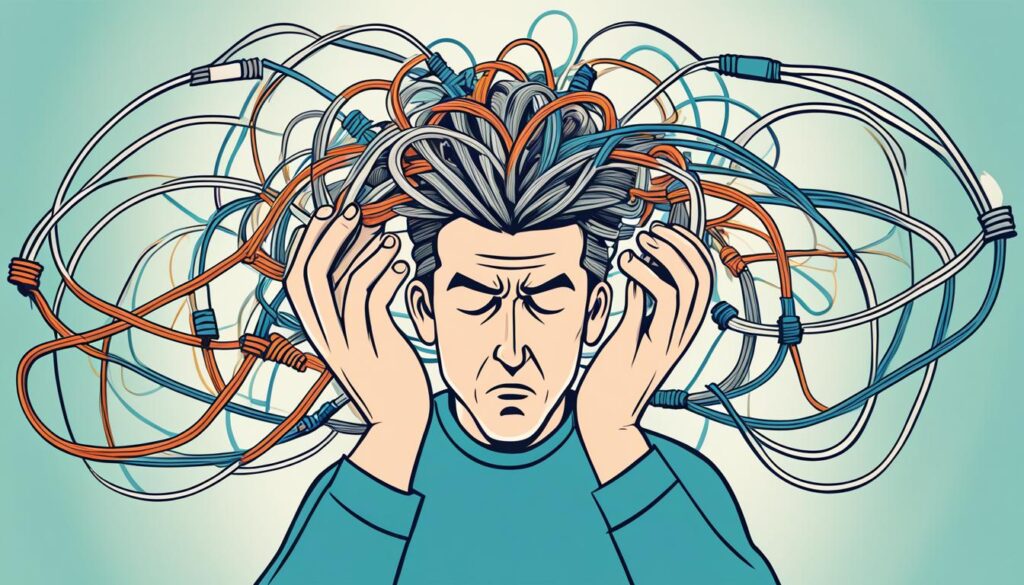9 Subtle Signs That Show You Are an Overthinker
If you’ve ever lost sleep over decisions or constantly doubted your choices, you might be an overthinker. But how can you be certain?
Overthinking disrupts your peace of mind and impacts your overall mental well-being. By recognizing these signs, you can begin to control your overthinking. So, are you ready to discover if you’re an overthinker and regain control of your thoughts? Let’s get started!
You Lose Sleep Due to Overthinking
One sign you might overthink is trouble sleeping. Your mind races with thoughts at night, making rest hard to find. This can affect your health and mental state.
Often, overthinkers have nights where they can’t sleep. Your mind might replay talks or worry about what’s to come. This can stop you from calming down and sleeping well, which leads to tiredness.
Not sleeping well can make you feel less energetic and focused during the day. It can also make you more stressed and moody. Over time, not getting enough sleep can lead to anxiety and depression.
Creating a nighttime routine can help with sleep issues caused by overthinking. Make your bedroom calm by removing distractions like phones. Try relaxing activities before bed.
Try doing deep breaths, meditation, or some stretching before bed. These can relax your mind and get you ready to sleep. Also, sleep better by keeping a regular bedtime, avoiding caffeine late, and making your sleeping area comfy.
Good sleep is very important for your body and mind. You’ll find more calm in life by managing your overthinking and improving your sleep.

Overthinking Causes Anxiety
Overthinking often leads to anxiety and stress. When you always analyze every detail, anxiety levels rise. This constant worry impacts your mental well-being.
Knowing the signs of overthinking is crucial. It helps to understand how it increases anxiety. This understanding allows you to take care of your mental health.
There are ways to calm anxiety from overthinking. Exercise releases endorphins, lowering stress. Also, mindfulness and meditation bring relaxation.
Self-care, like taking breaks or deep breathing, helps. Hobbies can distract you from overthinking. Support from a therapist or counselor is also helpful.

Remember, overthinking is common. Be patient with yourself while managing it. Use these strategies and focus on self-care to lessen anxiety. This improves mental well-being and brings peace.
Difficulty Letting Go of Past Decisions

Overthinkers often struggle with past decisions. They replay every choice in their minds. This leads to regret and self-doubt.
Dwelling on the past can trap them in their own thoughts. It affects their mental well-being, adding stress and anxiety.
Hatred Towards Making Decisions
If you overthink, making decisions might feel scary. The fear of a wrong choice can make you weigh every option. This often leads to feeling uncertain due to doubting your own judgment.
When it’s time to decide, overthinking can trap you. You might think of all that could go wrong. Even small choices can seem too big. This can make you feel stuck and tired.

Remember, many overthinkers feel this way about deciding. It’s common and doesn’t have to control you. Understanding your overthinking is the first step to overcoming it.
Try to focus on accepting imperfection, not chasing perfection. Know that mistakes are part of life. They help you learn and grow instead of fearing the wrong choice.
Setting deadlines for decisions can also help. Allow yourself time to think, then make a choice. Be willing to adjust if needed. Sometimes, not choosing is worse than a bad decision.
Seeking support is also a good idea. Friends, family, or a therapist can offer new views. Using mindfulness or meditation can also calm your thoughts. This makes decisions feel easier.
Using these steps can make decision-making easier. They can lessen stress and give you confidence. With less overthinking, you’ll enjoy a more decisive and happier life.
Constant Self-Criticism
If you always critique yourself, you might be an overthinker. Overthinkers often review their choices too much. They always doubt their skills, feeling they’re not good enough.
This habit can hurt your mental health. It can make you feel unworthy and lower your confidence. Doubting yourself stops you from seeing your true value.
But remember, being hard on yourself doesn’t help. Instead, be kind to yourself. Treat yourself as nicely as you would a close friend.
Catastrophizing Everything
Overthinkers often see the worst in every situation, called catastrophizing. They tend to make small issues seem huge. This causes a lot of worry and stress.
When overthinkers face a challenge, they think of the worst things that could happen. These thoughts can take over, making them feel scared and anxious.
Say, a minor problem at work might lead an overthinker to think they’ll lose their job. They fear they won’t find another one and lose money. This way of thinking can be very stressful.
Being cautious is good, but catastrophizing makes it hard to see things clearly. It gets in the way of solving problems and making good choices.
Overthinkers need to know when they are catastrophizing. They should try to change these thoughts. Positive thinking can help them feel better.
To stop catastrophizing, overthinkers should become more aware of their thoughts. Techniques like deep breathing, meditation, and grounding can help. These help calm the mind and focus on the present.
Catastrophizing is just one habit of overthinking. By managing it, overthinkers can improve their mental health. They can also see life in a more positive way.

Experiencing Repetitive Thoughts
Do you often find yourself thinking the same things over and over? This is a common trait of overthinkers. Your mind gets stuck in a loop, replaying ideas or worries. This can be tiring and keep you in an overthinking cycle.
Repetitive thoughts can be about past mistakes or future worries. They might be replaying conversations, imagining what else could have been said. These thoughts usually don’t help. They only make you feel more anxious and stressed.
Feeling stuck in these thoughts means you’re not alone. Many people overthink. Realizing you overthink is the first step to dealing with it. Knowing that your thoughts are repeated can help you break this pattern.
To fight these repeated thoughts, try being in the moment. Focus on where you are and what’s around you. This can help steer your mind away from the loop. Relaxing activities like meditation or deep breathing can also quiet your mind.
Remember, these repeating thoughts don’t show the real picture. They come from an active mind. You can challenge and change them. By being more aware and thinking healthier, you can control your thoughts. This will help you escape the overthinking cycle.

Muscle Tension
Overthinking isn’t just in your head. It can hurt your body too. Many people who think too much find their muscles tight. This mostly happens in the neck, shoulders, and back.
This tightness in muscles can cause soreness and headaches. It feels like you’re carrying your worries in your muscles. As you think more, the strain on your muscles grows. This can hurt your health over time.
It’s key to see how overthinking links to muscle tension. Knowing this helps you ease your body’s stress. Try working out, deep breathing, and yoga. Looking after yourself helps relax your muscles and improve your wellness.
Caring for your mind and body is vital. Being aware of overthinking’s signs and relaxing are important. This keeps you balanced and lessens the effects of overthinking on you.

Strategies to Manage Overthinking
If you often find yourself overthinking, there’s hope. There are proven ways to escape this cycle. By using certain tips and approaches, you can stop overthinking. This will help you take back control of your thoughts and feelings.
1. Practice Self-Awareness and Mindfulness
Learning to be self-aware is crucial to beat overthinking. Notice your thoughts, but don’t judge them. Stay mindful by living in the now. Don’t dwell on the past or worry about the future.
2. Engage in Stress Reduction Techniques
Stress and overthinking often go together. Add stress-busting habits to your day. This could be deep breaths, meditation, or doing things you love to relax.

3. Seek Therapy or Counseling
If overthinking harms your mental health, getting help is smart. A therapist or counselor can offer support. They have strategies to deal with overthinking.
4. Develop Healthy Coping Mechanisms
Avoid getting stuck in overthinking. Find good ways to handle stress and the unknown. Talk to someone you trust, try creative activities, or relax.
Using these methods, you can lessen overthinking and have a better mindset. Remember, stopping overthinking needs time and effort. Yet, with persistence and kindness to yourself, you can manage your thoughts. And lead a more balanced life.
The Impact of Overthinking on Mental Health
Overthinking can deeply affect your mental health. It often leads to more anxiety, stress, and sometimes depression. It’s not rare for people to overthink.
When you overthink, you may feel more anxious and restless. Overthinking makes you doubt yourself, see problems as bigger, and worry too much. This cycle of thinking too much can drain you.
Overthinking can harm your well-being. It makes relaxing and focusing hard. Over time, you might feel worn out and enjoy life less.
It’s key to handle your overthinking for better mental health. Noticing when you overthink and changing your thoughts can help you escape anxiety and stress.
Try stress relief methods like deep breathing, meditation, or fun activities. These can calm your mind. Getting help from therapists or counselors can also offer support and advice.
Taking care of your mental health matters. Working on your overthinking can bring better mental health, lower anxiety, and more peace within.
Conclusion
Overthinking can affect your life and mental health. You should take steps to handle your overthinking habits.
Getting better at managing overthinking takes time. It’s a journey, so be patient with yourself. Celebrate every little success. By focusing on your mental health and working on your overthinking habits, you can enjoy better mental health and a more balanced life view.







